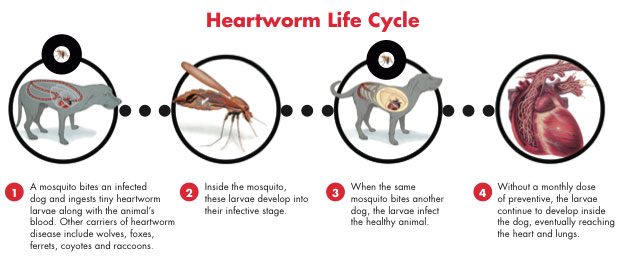This parasite got its name because the adult worm lives in or near a dog’s heart, however, heartworms can also be found in a pet’s lungs. Adult heartworms are long, white, slender and can grow up to 12 inches in length. Mosquitoes transmit heartworms. A mosquito bites an infected animal and takes in microfilariae, which grow to become infective, immature worms inside the mosquito. The infected mosquito then transfers the immature worms to a host, such as your dog. The worms then live inside your dog’s tissues and mature into adult worms that migrating to the heart and large blood vessels inside the lungs.
If heartworm is left untreated the infestation can kill a dog. Many pet owners don’t even realize their dog may be infected but fortunately, heartworm prevention in dogs is safe, effective and easy to administer. Preventing heartworm infection is also far easier than treating it. By keeping your pet on a heartworm preventive during the season, you’ll be protecting your them from these parasites and avoiding the cost of dealing with heartworm treatment.
 Heartworm Microfilaria surrounded by red blood cells as seen under a microscope.
Heartworm Microfilaria surrounded by red blood cells as seen under a microscope.
SIGNS AND COMPLICATIONS OF HEARTWORM DISEASE
In the early stages of the disease, many heartworm-infected dogs show no visible symptoms. But the continued presence of adult worms can cause changes that damage the heart and lungs. If left untreated, the reaction to adult heartworms can result in heart failure.
SINGS AND SYMPTOMS:
- Coughing
- Difficulty breathing
- Exercise intolerance
- Lethargy
- Loss of appetite
- Weight loss
- Swollen abdomen (caused by fluid accumulation)
WHAT YOU SHOULD KNOW ABOUT HEARTWORM INFECTION
The damage that heartworms cause depends on the number of worms present and the dog’s activity level. Although signs of heartworm disease can have an acute onset, chronic infection is more common. If not promptly and properly treated, the infection can damage the dog’s heart, lungs, liver, and kidneys. Canine heartworm disease is much easier to prevent than to treat financially and emotionally!
WHAT YOU CAN DO TO HELP
Your veterinarian can recommend appropriate testing and ongoing preventive treatment during the heartworm season (which is typically July to September in Ontario but depends on the weather). At the Mildmay Veterinary Clinic, we recommend testing for heartworm once every other year, unless your dog is at higher risk of contracting the disease (i.e. going further south in Ontario or to the states) at which point we like to do testing every year during their annual wellness visit.
PRODUCTS
Some of the products we have to offer at the clinic to prevent heartworm include Revolution, Advantage Multi, Sentinel, HeartGuard, Interceptor, and Trifexis. Please call or stop by the clinic to pick up your heartworm prevention and get some advice on which of our preventatives are best suited for you and your pet. We will instruct you on how to properly administer the medications, and for how long. Please note that we can only dispense your pet heartworm preventative medications if we have seen them for their Annual Wellness Visit with one of our veterinarians.


